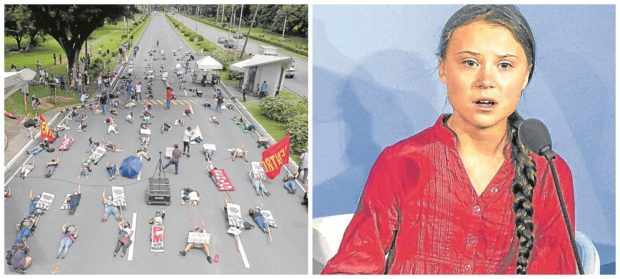
NEW ALLY Critics of the controversial antiterrorism law signed last week by President Duterte return to the main road going to the University of the Philippines Diliman campus in Quezon City for another demonstration on Tuesday. Helping them amplify their call on the international stage is climate activist Greta Thunberg, whose use of the Twitter hashtag #JunkTerrorLaw was enough to lift their spirits. —GRIG C. MONTEGRANDE/AFP FILE PHOTO
MANILA, Philippines — Climate activist Greta Thunberg has added her voice to calls of environmentalists to reject the new Anti-Terrorism Act, which human rights advocates and lawyers have assailed as yet another weapon that the government may use to clamp down on critics.
In her Twitter post on Monday night, the 17-year-old Swedish activist called for support for climate activists in the Philippines, as she retweeted a post by Fridays for Future, a global youth movement that she founded, that expressed solidarity with Filipino climate advocates.
Thunberg mentioned the Youth Advocates for Climate Action Philippines (Yacap) and used the hashtag #JunkTerrorLaw in her tweet, which had gained over 19,000 likes and more than 7,000 retweets as of Tuesday afternoon.
“We stand in solidarity with climate activists in the Philippines,” wrote Fridays for Future. “The Anti-Terror law puts climate activists and environmental defenders at the risk of being tagged as terrorists.”
Local environment and climate groups welcomed Thunberg’s support, saying the newly passed law, Republic Act No. 11479, threatens all forms of activism in the country, including the struggle against the climate crisis.
Support from other groups
“Climate justice will always be a call for social justice,” said Yacap convener Mitzi Tan. “We must hold the government accountable for their actions, especially actions that put people’s lives at risk.”
Several youth climate movements from different countries, including India, Germany, Taiwan and Portugal, have expressed concerns over the antiterrorism law, particularly the potential abuse and risks that environmental defenders will further face in the country that is already among the most dangerous for their struggle.
The digital arm of Fridays for Future movement has created an online toolkit that explains the law in different languages and encourages people around the world to call their respective Philippine embassies to reject it, according to Yacap.
“Thank you, Greta Thunberg,” said Leon Dulce, national coordinator of Kalikasan People’s Network for the Environment, in response to the young activist’s Twitter post. “We feel just a bit safer tonight here in the trenches with this warm and courageous gesture of yours.”
Even before its passage, the terror law has already gained the attention of the international community. UN human rights chief Michelle Bachelet warned against the measure, saying that its vague definition may violate the principle of legality.
Taylor Swift, too
On Instagram, singer-songwriter Taylor Swift posted a link to an online petition that called for the junking of the then antiterrorism bill. Filipino-Canadian drag queen Kyne has also been vocal against the law on her social media.
“The fact that my biggest problem right now is hate mail is an incredible privilege for me,” she said on Twitter. “Filipinos back home are about to lose their freedom of speech. This bill is a violation of human rights.”
In Manila, the Supreme Court has ordered the Duterte administration to explain why it should not strike down the Anti-Terrorism Act for allegedly violating the people’s constitutional rights.
At its weekly full court session on Tuesday, the high court gave the government 10 calendar days upon notice to formally respond to the four petitions filed on Monday challenging the legality of RA 11479.
Drugs, terror groups
Sen. Ronald dela Rosa said the antiterror law would benefit the country’s war on drugs.
The former chief of the Philippine National Police, who led the administration’s campaign against illegal narcotics, said drug lords and terror groups were keeping a symbiotic relationship.
“The drug lords feed the terror groups with drug money while the terror groups provide protection, shelter and safe haven to these drug lords, especially when they are in trouble,” Dela Rosa said in a message to reporters.
When the war on drugs was launched in 2016 and 2017, he said he received reports indicating that the drug traffickers the police were hunting in Metro Manila had fled to Mindanao and sought refuge in the lairs of the Maute group and the Islamic State.
—With reports from Dona Z. Pazzibugan and Leila B. Salaverria